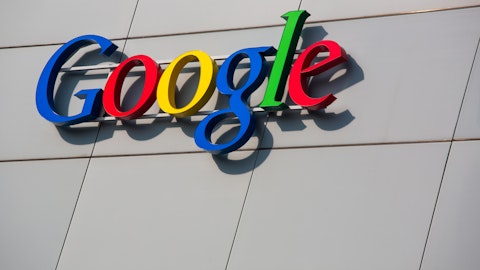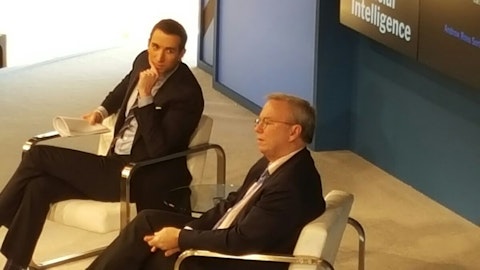Mr. Schmidt didn’t talk much about the differences between Google Inc (NASDAQ:GOOG) and Deepmind do compared to International Business Machines Corp. (NYSE:IBM)’s Watson and Facebook Inc (NASDAQ:FB), he briefly summarized the current state of the industry.
He said artificial Intelligence is divided into two categories 1) Narrow AI and 2) Artificial General Intelligence. He went on to give an example of narrow AI using Google Photos, when you upload a picture it knows where it is a giraffe or a car. So the reason why it knows is because it is trained. “You mention the Facebook technology, much of what you see there is essentially face recognition of one kind or another with clever algorithms using similar approaches, you mentioned the AI stuff that is largely linguistic using again the similar approaches. That’s the layout,” Schmidt added. Here is how the rest of the conversation went:
Eric Schmidt: In the last few years something else has happened. People begin to work on something which has much broader impact. And the easiest way to describe it is to describe the game of GO. It’s an Asian game, it was thought to be incomputable. There are so many possibilities .This is a board with little pieces on a 19 by 19 square. It’s combinatorially impossible for computers to handle and people were pretty sure of this. So a team that we acquired learned how to play games using computers. What you do is, you show it the game on the TV, and the computer figures out what the game is about, figures how the players are, figures how to win and can beat the human. It’s pretty impressive and they have won a series of awards for that. With GO they were able to build algorithms that would look at possibilities on this combinatoric space that was so complicated and they were actually able to winnow them out. Think of this as a simple form of judgment, I have all these choices but I was able to say I was only going to focus on this area or this area. A lot of people believe this which is called Reinforcement Learning is the beginning of something that is closer to our kind of intelligence. In the industry there are optimists and the pessimists. Optimists are those who believe that we will get to something that feels human-like in a decade and pessimists are those who think it would take 100 years. But the good news is we got time to think about it and a lot of people are working on it.
Then, Andrew Sorkin asked about how AI can impact issues like education or healthcare in a tangible way. Schmidt responded by describing how computers can help radiologists do a better job. Here is what he said:
“Everybody here goes to a radiologist and they take an X-ray and say “Oh! You are fine”. I would much rather have the computers analyze the radiology picture and then advise the doctor because that gives the doctor a better result. So the way economics really works is that you move up the skill, you get higher income because you have a better service. I mentioned radiology because computers have better vision than humans. That is a pretty big deal. So what do you do with vision beside this? Dermatology, radiology, things that involve vision skills. These are relatively automatable. That does not mean the dermatologist goes away, rather he or she becomes more efficient. Does a better job and becomes accurate. There is a simple example, there is a disease called diabetic retinopathy which involves looking at the back of your eye, terrible disease and you can see changes in the blood vessels. This a major cause of blindness in the third world. We can now diagnose this using a computer picture of your retina at a much greater accuracy than the best human can. Computers are just better at this stuff. …So you should expect that in the next decade you would use tools that with humans make them more efficient, safer and productive. It’s a speculation what happens after that.”
At the end of the interview Sorkin mentioned Tesla Motors Inc (NASDAQ:TSLA)’s Elon Musk’s comments about AI. “I think we should be very careful about AI. If I were to guess what our biggest existential threat is probably that. With AI we are summoning daemon who we won’t be able to control” said Elon Musk.
Mr. Schmidt disagrees. “Our biggest existential threat is a nuclear war. Let’s just get the facts right,” said Schmidt. He said he is convinced that as we adopt this technology, although there are a few bumps in the road, the result is the continuing pattern of fewer deaths, economic growth and general prosperity.
Disclosure: None





